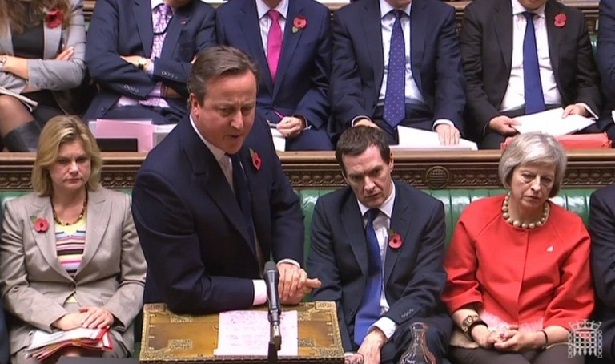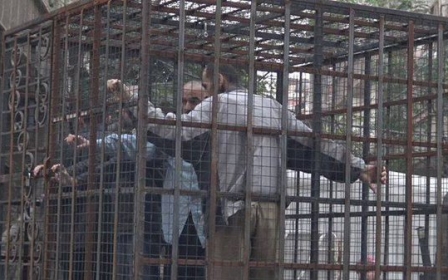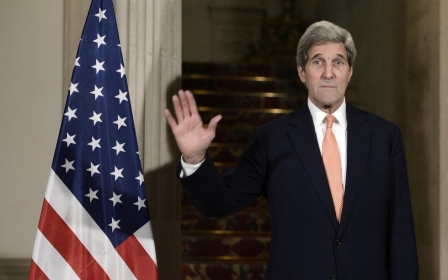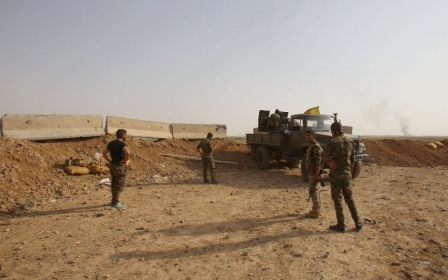MPs call Cameron's Syria air strike push 'incoherent'

Britain should not join air strikes on Syria until there is a clear strategy to defeat the Islamic State (IS) group and bring peace to the country, an influential committee of MPs said Tuesday.
Prime Minister David Cameron's government wants to extend Britain's current involvement in US-led air strikes on targets in Iraq into Syria if it can get support from across the political spectrum in a House of Commons vote.
However, the Commons Foreign Affairs Committee said in a new report that Cameron's focus on joining air strikes was "incoherent" and "a distraction".
"We are concerned that the government is focusing on extending airstrikes to Syria ... without any expectation that its action will be militarily decisive, and without a coherent and long-term plan for defeating ISIL [IS] and ending the civil war," said committee chairman Crispin Blunt, a senior MP for Cameron's Conservatives.
"There is now a miscellany of uncoordinated military engagements by an alarming range of international actors in Iraq and Syria ... These forces desperately need coordinating into a coherent strategy and that is where our efforts should be focused."
Blunt urged the government to concentrate on supporting international diplomacy to end the conflict, which has killed over 250,000 people, following last week's talks in Vienna attended by 17 countries.
The Guardian reported that shadow justice secretary Lord Falconer expressed thoughtful hesitance, saying that he would back air strikes under the right conditions, but encouraged caution as well.
“We’ve got to think in the national interest what do we add by adding our planes to the American attacks on Raqqa and ISIL strongholds in Syria? If there is a proper military basis for us doing that and it assists the national interest, and in particular national security, I would be in favour of it. But the government have got to come forward with a proper basis for it.” Falconer said.
Cameron has said he will only push a vote on Syrian air strikes in the Commons if there is a "genuine consensus" behind the plan.
Several newspapers reported late on Monday that Cameron had dropped his plan for a vote, in the wake of Russia's entry into the war by bombing to support the embattled government of President Bashar al-Assad.
Cameron assessed that air strikes would not now have the support of enough MPs to pass, given his Conservative party's slim majority of 12 in the House of Commons, the Guardian and Times reported.
A source in Cameron's office emphasised that he would not seek a vote without broad support.
"He's consistently said that we would only go back to the House on this issue if there was clear consensus," the source said.
"Meanwhile, the government continues to work to bring the conflict to an end in Syria and we are working closely with our allies to inject greater momentum into efforts to find a political solution."
'Every tool available'
The government has argued that it is illogical to conduct air strikes in Iraq and not neighbouring Syria, saying the two countries are "a single theatre of conflict".
In his response to the report, Foreign Secretary Philip Hammond did not directly mention the possibility of a vote on Britain joining air strikes on Syria but said ministers would use "every tool available" to save lives in the region.
"RAF air strikes against ISIL are not the sole solution but military action, in coordination with our coalition allies, is having a substantial impact in degrading ISIL in Iraq," he added.
"It is right that we continue to use military force against ISIL while we use diplomatic power to work towards a political solution in the Syrian war."
Cameron's previous coalition government was badly bruised by a Commons defeat over a plan to launch air strikes in Syria in 2013 and ministers are keen to avoid a similar result.
The new leader of the main opposition Labour party, Jeremy Corbyn, is a leading anti-war campaigner who is opposed to extending air strikes, although some Labour MPs support the move.
For action in Iraq, Britain is currently part of a coalition of over 60 countries and has eight Tornado jets flying missions plus an unconfirmed number of Reaper drones.
This was approved by parliament in September last year.
Middle East Eye propose une couverture et une analyse indépendantes et incomparables du Moyen-Orient, de l’Afrique du Nord et d’autres régions du monde. Pour en savoir plus sur la reprise de ce contenu et les frais qui s’appliquent, veuillez remplir ce formulaire [en anglais]. Pour en savoir plus sur MEE, cliquez ici [en anglais].




